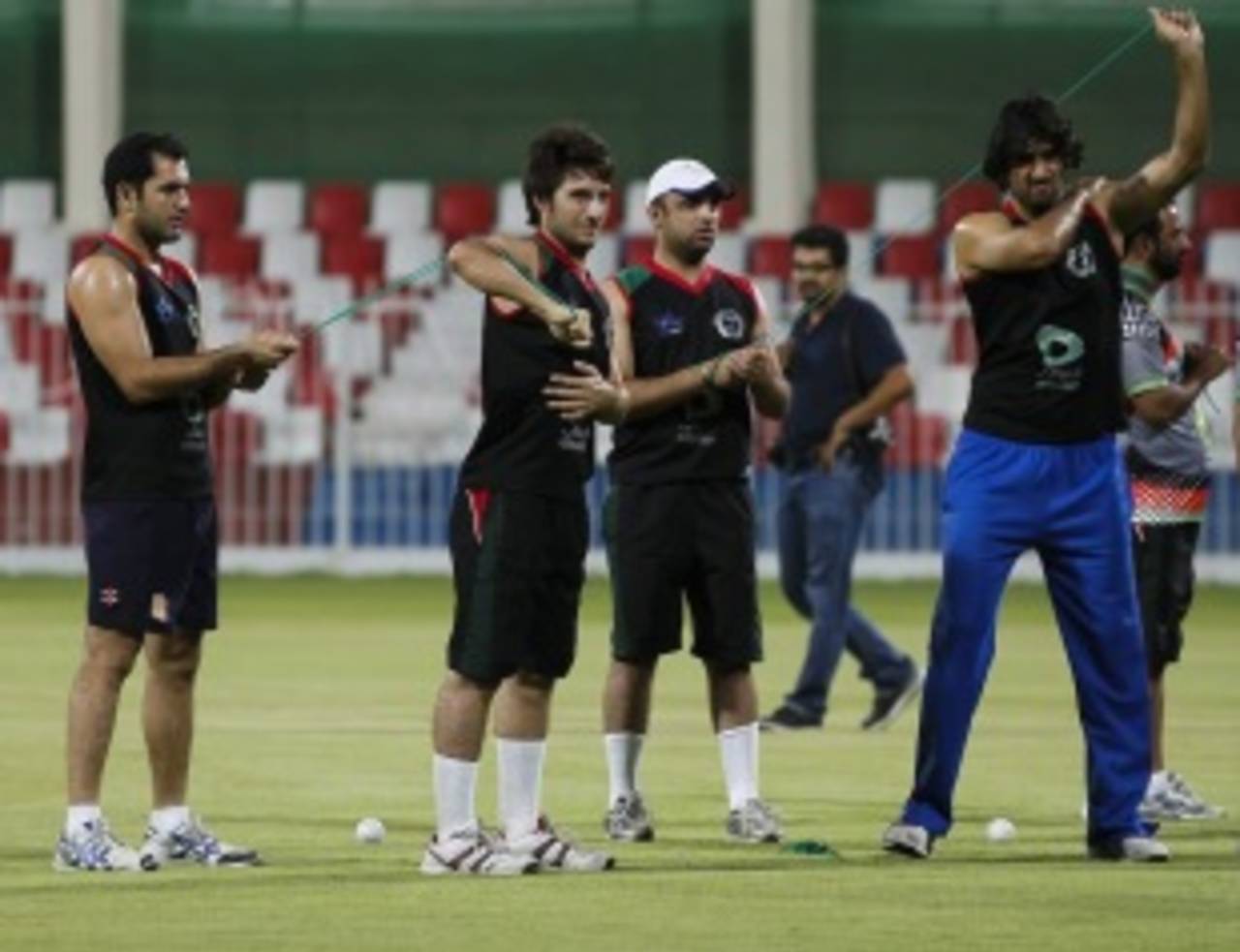Afghanistan are professional cricketers, don't forget
The story of Afghanistan cricket is absolutely amazing. It's got a book, a documentary, and is mentioned in almost every article about them
Jarrod Kimber
25-Feb-2013

Afghanistan deserve to be spoken about as cricketers, not charming curiosities • Associated Press
The story of Afghanistan cricket is absolutely amazing. It's got a book, a documentary, and is mentioned in almost every article about them. So much so that their cricket deeds are often an afterthought. That these cricketers come from a war torn country, that some were refugees, and that some have had to overcome amazing hardships is a phenomenal story.
Just to make it from the bottom of the Affiliates to the top is nothing short of inspirational. But they have, twice, and it's perhaps time we focus on what the men before us actually are. Cricketers.
When, on the eve of the World Twenty20, Hamid Hassan told ESPNcricinfo that he might not be able to play the tournament, he looked on the verge of tears. This was a man who had spent months and months in the gym at Lord's, sweating and working. Hassan did this because he is a cricketer, and he wanted to be the best cricketer he could be, overcome his injuries and play in this tournament.
This is a professional cricket side. They haven't been professional for long, but they haven't been picked off the street a week ago. They've been together as a unit for months; they were runners-up to Ireland in the qualifying tournament and then spent over a month in Dubai, simply preparing to play in this tournament.
They deserve to be spoken about as cricketers, not charming curiosities.
Shapoor Zadran started the England match with a wicket maiden. It wasn't charity because of his past, he just bowls really well at times. Even though the speed guns don't suggest great pace, he seems to hurry top class batsmen. And he virtually bowled Kieswetter off the face of the bat. Shapoor opened up with Dawlat Zadran; this double dose of Zadran is brilliant to behold. Both men are natural wicket-takers; they attack at will, leak runs, but also look like taking a wicket at any time. At times both got startling bounce and worried the England batsmen. Their keeper, Mohammad Shahzad, who's vertical leap is not as impressive as his stroke play, simply couldn't reach one ball.
Samiullah Shenwari is a legspinner with a stop-start jaunty action who mixes up his pace the way you have to in T20 if you don't want to end up bowling only one over a game. When he uses flight it's clever, his quicker ball skids on, and he can spin the ball. Karim Sadiq, their veteran allrounder, bowls much like David Hussey - less spin than fast balls off a few quick steps. When Sadiq was bowling with Shenwari, Afghanistan were holding on. England had scored only 84 runs in the first 12 overs, despite scoring 37 in the fifth and sixth over alone.
Then their fielding fell apart, and everything went with it.
It didn't fall apart, it shattered on the ground like a crystal vase spear chucked down from a third-story window. Once it goes bad, they're a team almost incapable of any defence. Giving away overthrows is almost a prerequisite for this team, even if there is little or no chance of a run out. Mohammad Shahzad seems to abuse a player every second over for not backing up a throw. Occasionally a ball will go straight through the hands or legs of an Afghanistan player, reminding you of how far they still have to go. Catches are at best a 50-50 proposition, and they even managed to step on the rope when taking a simple catch off a free hit.
These are proud men. This fielding would embarrass them; this fielding would embarrass a club side. Their bowlers would feel rightfully let down. They could, and should have done better.
They had a chance at redemption with their batting. They couldn't do it. Against India they refused to give up. Against England, they did it absolutely. Their batting plan is to hit the ball as hard and as often as they can. You can see them get the shakes when more than one dot ball occurs. It's going to work sometimes, and not work at others. For Gulbodin Naib it worked, for the others it did not. Maybe it was them playing their normal reckless game. Or maybe, to their credit, they realised that if you're chasing 197 and your team only likes to hit boundaries, you might as well encourage it. Even if it does end with you on 80, a loss is a loss.
Every team in this World Twenty20 has its own set of unique circumstances. Afghanistan is just another team. If we think of them as anything else, we're doing them a disservice as cricketers. I hope they left the field disappointed that they hadn't done their best. I hope their captain and coach abused them for their sloppiness in the field. I hope their batsmen were embarrassed, that they asked their analysts to burn the recordings; that bats were thrown, kits were kicked and tears were shed.
This is not what they came here to do. They've failed. They can do better. Now they need to use this failure, channel the embarrassment and make themselves into the cricketers that their talent deserves. That is what cricketers from all around the world strive to do.
They're cricketers with an amazing history that most of us will never be able to fully comprehend, but they're also just cricketers. They do warm-ups, drop catches and love to hit boundaries. They're probably just taking it one game at a time while trying to get some momentum. It's what cricketers do.
Jarrod Kimber is 50% of the Two Chucks, and the mind responsible for cricketwithballs.com